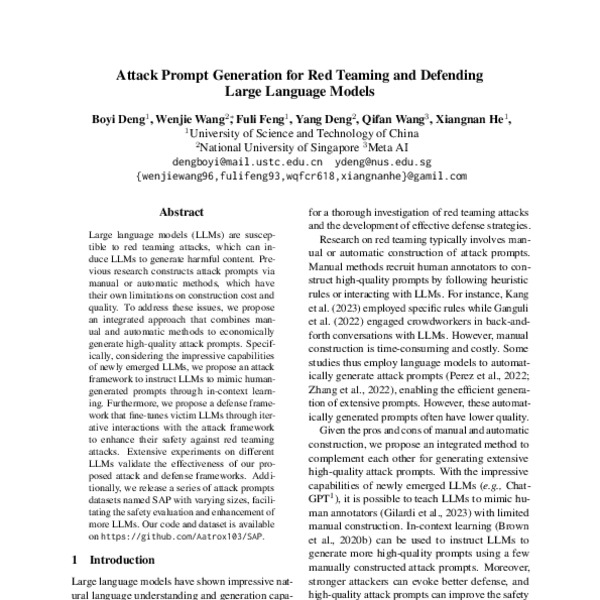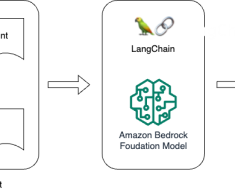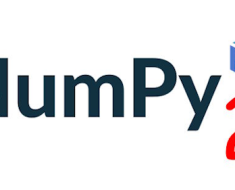
@inproceedings{deng-etal-2023-attack,
title = "Attack Prompt Generation for Red Teaming and Defending Large Language Models",
author = "Deng, Boyi and
Wang, Wenjie and
Feng, Fuli and
Deng, Yang and
Wang, Qifan and
He, Xiangnan",
editor = "Bouamor, Houda and
Pino, Juan and
Bali, Kalika",
booktitle = "Findings of the Association for Computational Linguistics: EMNLP 2023",
month = dec,
year = "2023",
address = "Singapore",
publisher = "Association for Computational Linguistics",
url = "https://aclanthology.org/2023.findings-emnlp.143",
doi = "10.18653/v1/2023.findings-emnlp.143",
pages = "2176--2189",
abstract = "Large language models (LLMs) are susceptible to red teaming attacks, which can induce LLMs to generate harmful content. Previous research constructs attack prompts via manual or automatic methods, which have their own limitations on construction cost and quality. To address these issues, we propose an integrated approach that combines manual and automatic methods to economically generate high-quality attack prompts. Specifically, considering the impressive capabilities of newly emerged LLMs, we propose an attack framework to instruct LLMs to mimic human-generated prompts through in-context learning. Furthermore, we propose a defense framework that fine-tunes victim LLMs through iterative interactions with the attack framework to enhance their safety against red teaming attacks. Extensive experiments on different LLMs validate the effectiveness of our proposed attack and defense frameworks. Additionally, we release a series of attack prompts datasets named SAP with varying sizes, facilitating the safety evaluation and enhancement of more LLMs.",
}
<?xml version="1.0" encoding="UTF-8"?>
<modsCollection xmlns="http://www.loc.gov/mods/v3">
<mods ID="deng-etal-2023-attack">
<titleInfo>
<title>Attack Prompt Generation for Red Teaming and Defending Large Language Models</title>
</titleInfo>
<name type="personal">
<namePart type="given">Boyi</namePart>
<namePart type="family">Deng</namePart>
<role>
<roleTerm authority="marcrelator" type="text">author</roleTerm>
</role>
</name>
<name type="personal">
<namePart type="given">Wenjie</namePart>
<namePart type="family">Wang</namePart>
<role>
<roleTerm authority="marcrelator" type="text">author</roleTerm>
</role>
</name>
<name type="personal">
<namePart type="given">Fuli</namePart>
<namePart type="family">Feng</namePart>
<role>
<roleTerm authority="marcrelator" type="text">author</roleTerm>
</role>
</name>
<name type="personal">
<namePart type="given">Yang</namePart>
<namePart type="family">Deng</namePart>
<role>
<roleTerm authority="marcrelator" type="text">author</roleTerm>
</role>
</name>
<name type="personal">
<namePart type="given">Qifan</namePart>
<namePart type="family">Wang</namePart>
<role>
<roleTerm authority="marcrelator" type="text">author</roleTerm>
</role>
</name>
<name type="personal">
<namePart type="given">Xiangnan</namePart>
<namePart type="family">He</namePart>
<role>
<roleTerm authority="marcrelator" type="text">author</roleTerm>
</role>
</name>
<originInfo>
<dateIssued>2023-12</dateIssued>
</originInfo>
<typeOfResource>text</typeOfResource>
<relatedItem type="host">
<titleInfo>
<title>Findings of the Association for Computational Linguistics: EMNLP 2023</title>
</titleInfo>
<name type="personal">
<namePart type="given">Houda</namePart>
<namePart type="family">Bouamor</namePart>
<role>
<roleTerm authority="marcrelator" type="text">editor</roleTerm>
</role>
</name>
<name type="personal">
<namePart type="given">Juan</namePart>
<namePart type="family">Pino</namePart>
<role>
<roleTerm authority="marcrelator" type="text">editor</roleTerm>
</role>
</name>
<name type="personal">
<namePart type="given">Kalika</namePart>
<namePart type="family">Bali</namePart>
<role>
<roleTerm authority="marcrelator" type="text">editor</roleTerm>
</role>
</name>
<originInfo>
<publisher>Association for Computational Linguistics</publisher>
<place>
<placeTerm type="text">Singapore</placeTerm>
</place>
</originInfo>
<genre authority="marcgt">conference publication</genre>
</relatedItem>
<abstract>Large language models (LLMs) are susceptible to red teaming attacks, which can induce LLMs to generate harmful content. Previous research constructs attack prompts via manual or automatic methods, which have their own limitations on construction cost and quality. To address these issues, we propose an integrated approach that combines manual and automatic methods to economically generate high-quality attack prompts. Specifically, considering the impressive capabilities of newly emerged LLMs, we propose an attack framework to instruct LLMs to mimic human-generated prompts through in-context learning. Furthermore, we propose a defense framework that fine-tunes victim LLMs through iterative interactions with the attack framework to enhance their safety against red teaming attacks. Extensive experiments on different LLMs validate the effectiveness of our proposed attack and defense frameworks. Additionally, we release a series of attack prompts datasets named SAP with varying sizes, facilitating the safety evaluation and enhancement of more LLMs.</abstract>
<identifier type="citekey">deng-etal-2023-attack</identifier>
<identifier type="doi">10.18653/v1/2023.findings-emnlp.143</identifier>
<location>
<url>https://aclanthology.org/2023.findings-emnlp.143</url>
</location>
<part>
<date>2023-12</date>
<extent unit="page">
<start>2176</start>
<end>2189</end>
</extent>
</part>
</mods>
</modsCollection>
%0 Conference Proceedings %T Attack Prompt Generation for Red Teaming and Defending Large Language Models %A Deng, Boyi %A Wang, Wenjie %A Feng, Fuli %A Deng, Yang %A Wang, Qifan %A He, Xiangnan %Y Bouamor, Houda %Y Pino, Juan %Y Bali, Kalika %S Findings of the Association for Computational Linguistics: EMNLP 2023 %D 2023 %8 December %I Association for Computational Linguistics %C Singapore %F deng-etal-2023-attack %X Large language models (LLMs) are susceptible to red teaming attacks, which can induce LLMs to generate harmful content. Previous research constructs attack prompts via manual or automatic methods, which have their own limitations on construction cost and quality. To address these issues, we propose an integrated approach that combines manual and automatic methods to economically generate high-quality attack prompts. Specifically, considering the impressive capabilities of newly emerged LLMs, we propose an attack framework to instruct LLMs to mimic human-generated prompts through in-context learning. Furthermore, we propose a defense framework that fine-tunes victim LLMs through iterative interactions with the attack framework to enhance their safety against red teaming attacks. Extensive experiments on different LLMs validate the effectiveness of our proposed attack and defense frameworks. Additionally, we release a series of attack prompts datasets named SAP with varying sizes, facilitating the safety evaluation and enhancement of more LLMs. %R 10.18653/v1/2023.findings-emnlp.143 %U https://aclanthology.org/2023.findings-emnlp.143 %U https://doi.org/10.18653/v1/2023.findings-emnlp.143 %P 2176-2189
Markdown (Informal)
[Attack Prompt Generation for Red Teaming and Defending Large Language Models](https://aclanthology.org/2023.findings-emnlp.143) (Deng et al., Findings 2023)




